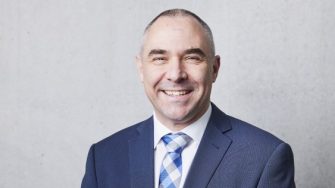Engineering: “The most exciting profession people have never heard of”
Addressing engineering’s visibility problem
Addressing engineering’s visibility problem

NORA:
What do you study at school?
HAE SUNG:
Engineering.
NORA:
I know nothing about that.
[End scene]
This brief exchange between the two main characters in Past Lives (2023) is easy to miss, but for aspiring engineers, it is a conversation that feels all too familiar.
Engineers play a role in every aspect of our lives. Ensuring the water we drink is clean, finding life-saving breakthroughs in medical technology, addressing complex challenges of the climate crisis head-on, and creating the software we use to stream the latest critically acclaimed romantic drama.
But despite the industry’s significant breadth and impact, there is a sense that few people outside engineering actually understand what it is.
Professor Julien Epps, the new Dean of Engineering at UNSW, recognises that this visibility problem is creating barriers for people looking for a rewarding career, but who are not aware of the opportunities engineering can present.
He says, “an amazing thing about engineering is that a lot of people have never heard about it. Engineering is making all these contributions already; it just doesn’t have that visibility. And that’s causing a lot of missed opportunities.”
“There are people who want to make contributions and have exciting careers, but they don’t know that engineering could be the pathway to do it.”
For those who have never met an engineer, “the word “engineering” generally conjures up images of someone with a hard hat, probably male, surrounded by complex equipment,” says Prof. Epps. This, he says, is “detached from the reality of most engineers.”
“Engineering is a profession that often involves design, it’s often done in teams that include female engineers, the work is often carried out on computers, and involves evaluating designs with the people they’re intended for. There can be site work – I have sometimes worn hard hats – but it’s never the whole job.”
While engineering requires a strong grasp of theoretical and practical skills, Prof. Epps also encourages students to develop skills for connecting engineering with the society it serves, such as communicating technical concepts to non-engineers and collaborating across disciplines.
“As an engineer, you are going to be in a lot of meetings with people who will never know the good work you have done, unless you can explain it to them in an approachable way. This is harder than it sounds and is something a lot of engineers grapple with for their whole careers.”
“Some engineers could be better networkers and can miss out on opportunities as a result. Great things happen when you can learn to feel comfortable connecting with people across disciplines.”
Prof. Epps hopes that shining a light on the engineering industry will help break down stereotypes and encourage an influx of new minds to the profession.
“As engineers, we need to invite the rest of society to understand what engineering is and unpack the profession a bit more for everyone,” he says. “Great projects, innovations and contributions need to be clearly marked as “brought to you by engineers”.”
Part of the solution may be harnessing media in all its forms to give the public a more authentic impression of the people behind the industry, Prof. Epps suggests.
“Somehow we have to get more engineers, and a greater representation of the diversity of engineers, into popular media to show they are relatable people that we can all aspire to be, rather than thin stereotypes.”
“Social media is addressing this a bit – there are many great souls out there doing a terrific job, sharing what engineering careers look like to demystify for those who have never met an engineer.”
Recognising the most common trait among engineers is a passion for solving challenging problems, the new Dean of Engineering has a call to action:
“We have to pose the visibility of the profession as a problem. If we pose it as a problem, engineers will want to solve it.”
As Australia’s best engineering faculty turns 75, there are just as many reasons why we’ve earned that title. Discover new stories weekly, celebrating the successes that have enabled progress for all.